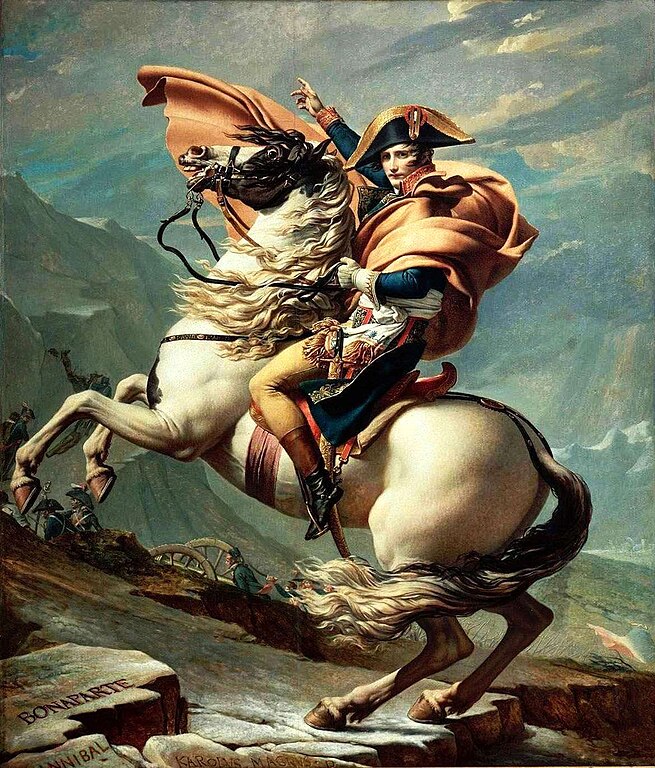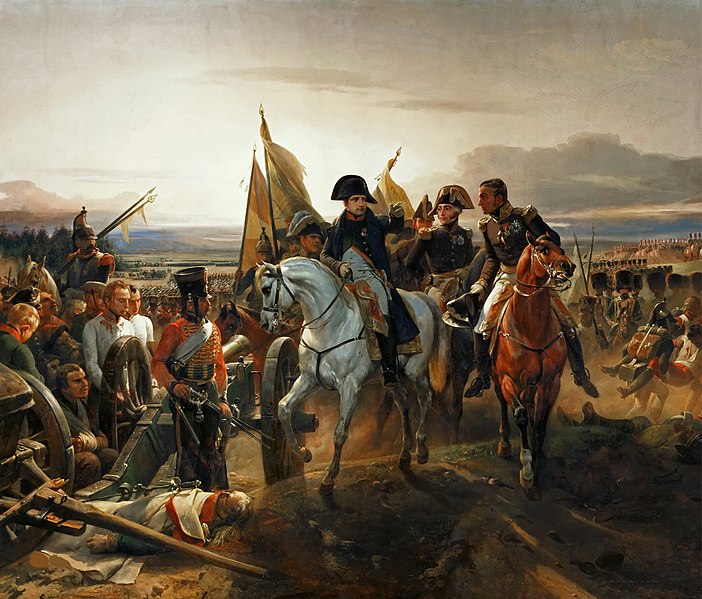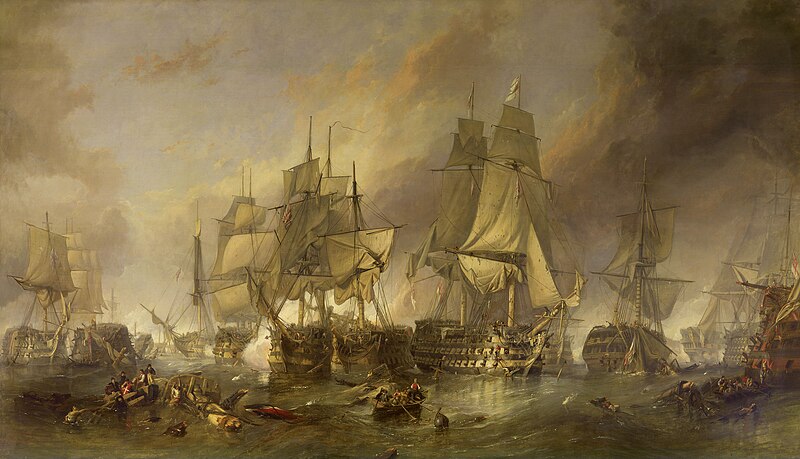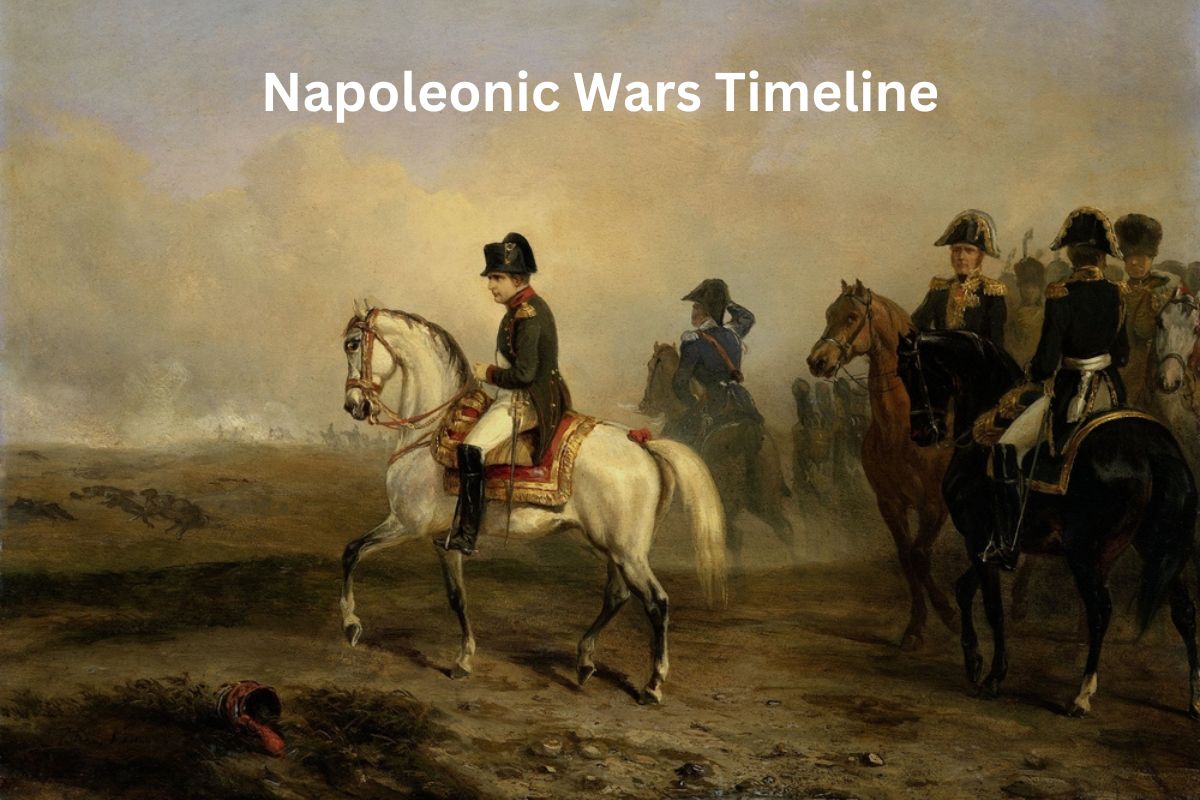The Napoleonic Wars, spanning from 1803 to 1815, were a series of conflicts centered around the ambitious expansion of Napoleon Bonaparte’s French Empire and the resulting coalitions of European powers seeking to counter his dominance.
These wars marked a transformative period in European history, characterized by strategic military maneuvers, shifting alliances, and a profound impact on the political and societal structures of the time.
From Napoleon’s early victories to his eventual downfall and exile, the Napoleonic Wars reshaped the continent’s landscape and set the stage for a new era of European diplomacy and governance.

| Year | Event |
|---|---|
| 1803 | – May 18: Britain declares war on France. |
| – Naval conflicts between France and Britain, including the Battle of Trafalgar. | |
| 1804 | – Napoleon declares himself Emperor of the French. |
| 1805 | – October 21: Battle of Trafalgar; British navy defeats combined French and Spanish fleet. |
| – November 15: Napoleon’s victory at the Battle of Austerlitz against Austro-Russian coalition. | |
| 1806 | – Formation of the Continental System, an economic blockade against Britain. |
| 1807 | – June 14: Napoleon’s victory at the Battle of Friedland against the Russians. |
| – July 7: Treaty of Tilsit signed between France and Russia. | |
| 1808 | – Peninsular War begins as Spain and Portugal resist French occupation. |
| 1809 | – April 19-22: Battle of Eckmühl; Napoleon defeats the Austrians. |
| – July 6-14: Battle of Wagram; French victory against the Austrians. | |
| 1812 | – June 24: Napoleon invades Russia with the Grande Armée. |
| – September: Disastrous retreat from Moscow. | |
| 1813 | – Formation of the Sixth Coalition (Britain, Russia, Prussia, Austria, Sweden). |
| – October 16-19: Battle of Leipzig (Battle of Nations); coalition defeats Napoleon’s forces. | |
| 1814 | – March 31: Paris falls, Napoleon abdicates. |
| – April: Napoleon exiled to Elba, Louis XVIII restored to French throne. | |
| 1815 | – March 1: Napoleon escapes Elba, returns to France. |
| – June 18: Battle of Waterloo; coalition defeats Napoleon. | |
| – June 22: Napoleon abdicates again, exiled to Saint Helena. | |
| 1821 | – May 5: Napoleon dies in exile on Saint Helena. |
Timeline of the Napoleonic Wars
1803 – Britain declares war on France
May 18: Britain officially declares war on France, marking the beginning of the Napoleonic Wars. This declaration was in response to Napoleon’s increasing power and ambitions in Europe.

1804 – Napoleon declares himself Emperor of the French
May 18: Napoleon Bonaparte declares himself Emperor of the French, establishing a new imperial dynasty. This move solidifies his power and authority within France.
Also Read: Napoleon Accomplishments
December 2: In a grand ceremony at the Cathedral of Notre Dame in Paris, Napoleon crowns himself Emperor Napoleon I. This act is a significant departure from the French Republic’s previous anti-monarchical stance.
1805 – Battle of Trafalgar; Napoleon’s victory at the Battle of Austerlitz
October 21: The Battle of Trafalgar takes place off the coast of Spain. Admiral Horatio Nelson leads the British Royal Navy to a decisive victory over the combined French and Spanish fleets.
Although Nelson dies during the battle, the British victory secures their naval supremacy and prevents Napoleon’s plans for an invasion of Britain.
Also Read: French Revolution Facts
December 2: Napoleon achieves a major military triumph at the Battle of Austerlitz, also known as the Battle of the Three Emperors. French forces, under Napoleon’s leadership, defeat a Russian and Austrian coalition.
The victory further strengthens Napoleon’s position in Europe and solidifies his image as a military genius.
1806 – Continental System is established
Continental System: Napoleon introduces the Continental System, an economic blockade aimed at isolating Britain from continental trade. This policy forces European nations under French influence to cease trade with Britain, with the goal of weakening Britain’s economy and its ability to resist Napoleon’s expansion.
July 14: Napoleon achieves a significant victory at the Battle of Jena-Auerstedt against Prussia. This battle underscores Napoleon’s military prowess and his ability to rapidly defeat well-established European powers.

1807 – Napoleon’s victory at the Battle of Friedland; Treaty of Tilsit with Russia
June 14: The Battle of Friedland takes place, resulting in a decisive victory for Napoleon against the Russians. This victory prompts Tsar Alexander I of Russia to seek peace negotiations with France.
July 7: The Treaty of Tilsit is signed between France and Russia. This treaty ends the War of the Fourth Coalition and establishes a temporary alliance between Napoleon and Tsar Alexander I. It also leads to a realignment of political boundaries in Europe.
1808 – Peninsular War begins in Spain and Portugal
Peninsular War: The conflict known as the Peninsular War begins when Napoleon’s forces invade Spain and Portugal. The Spanish and Portuguese populations, along with British support, engage in a prolonged guerrilla resistance against the French occupation. This war diverts French resources and weakens Napoleon’s control in the Iberian Peninsula.
1809 – Battles of Eckmühl and Wagram; victory for Napoleon
April 19-22: Napoleon achieves a victory at the Battle of Eckmühl against the Austrians. This battle demonstrates Napoleon’s tactical prowess and the effectiveness of his military strategies.
July 6-14: The Battle of Wagram takes place, resulting in a French victory over the Austrians. The battle is one of the largest of the Napoleonic Wars and solidifies Napoleon’s control over much of central Europe.
1810 – Marriage and Growing Opposition
March 11: Napoleon marries Marie Louise of Austria, cementing an alliance with the Habsburg dynasty. This marriage aims to strengthen Napoleon’s legitimacy and secure a powerful ally.
Growing Opposition: Opposition to Napoleon’s rule continues to grow across Europe. Nationalistic sentiments rise, and resistance to French dominance becomes more pronounced in various regions.
1812 – Napoleon invades Russia; disastrous retreat from Moscow
June 24: Napoleon launches his ill-fated invasion of Russia with the massive Grande Armée. The campaign initially advances but faces challenges due to harsh weather, supply shortages, and Russian scorched-earth tactics.
September: The disastrous retreat from Moscow begins as Napoleon’s forces are compelled to withdraw due to the approaching Russian winter and the depletion of resources. The retreat results in massive losses and severely weakens the Grande Armée.

1813 – Sixth Coalition forms; Battle of Leipzig (Battle of Nations)
Sixth Coalition: The Sixth Coalition forms, including Britain, Russia, Prussia, Austria, and Sweden, with the shared goal of defeating Napoleon.
October 16-19: The Battle of Leipzig, also known as the Battle of Nations, takes place. This battle is one of the largest in history, involving over half a million soldiers. The coalition decisively defeats Napoleon’s forces, marking a turning point in the war and forcing Napoleon to retreat.
1814 – Paris falls, Napoleon abdicates; exiled to Elba
March 31: Paris falls to the coalition forces, and Napoleon is compelled to abdicate the throne. The Treaty of Fontainebleau is signed, exiling Napoleon to the island of Elba while restoring the Bourbon monarchy under Louis XVIII.
1815 – Napoleon escapes, returns; Battle of Waterloo; Napoleon abdicates again, exiled to Saint Helena
March 1: Napoleon escapes from Elba and returns to France in what is known as the “Hundred Days.” His return sparks excitement and unrest across Europe.
June 18: The Battle of Waterloo takes place in Belgium. Napoleon’s forces face a combined British and Prussian army led by the Duke of Wellington and Gebhard Leberecht von Blücher. The battle results in Napoleon’s defeat, marking the end of his rule.
June 22: Napoleon abdicates for the second time and is exiled to the remote island of Saint Helena in the South Atlantic.
1821 – Napoleon dies in exile on Saint Helena
In 1821, the tumultuous life of Napoleon Bonaparte came to an end as he died in exile on the remote island of Saint Helena. This marked the final chapter in the saga of the man who had risen from obscurity to become one of history’s most renowned military leaders and political figures.
While in exile, Napoleon’s health deteriorated, and his death signified the end of an era that had seen his meteoric rise, the reshaping of Europe through his conquests, and his eventual downfall at the hands of coalitions determined to curb his influence.
Napoleon’s legacy continued to reverberate across history, impacting political ideologies, warfare strategies, and the shaping of the modern world.
